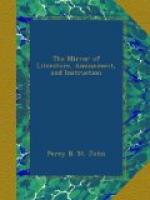There is another and somewhat sublime story of the same class, which belongs to the most interesting moment of Caesar’s life; and those who are disposed to explain all such tales upon physiological principles, will find an easy solution of this, in particular, in the exhaustion of body, and the intense anxiety which must have debilitated even Caesar under the whole circumstances of the case. On the ever-memorable night when he had resolved to take the first step (and in such a case the first step, as regarded the power of retreating, was also the final step) which placed him in arms against the state, it happened that his head-quarters were at some distance from the little river Rubicon, which formed the boundary of his province. With his usual caution, that no news of his motions might run before himself, on this night Caesar gave an entertainment to his friends, in the midst of which he slipped away unobserved, and with a small retinue proceeded through the woods to the point of the river at which he designed to cross. The night was stormy, and by the violence of the wind all the torches of his escort were blown out, so that the whole party lost their road, having probably at first intentionally deviated from the main route, and wandered about through the whole night, until the early dawn enabled them to recover their true course. The light was still grey and uncertain, as Caesar and his retinue rode down upon the banks of the fatal river—to cross which with arms in his hands, since the further bank lay within the territory of the Republic, ipso facto proclaimed any Roman a rebel and a traitor. No man, the firmest or the most obtuse, could be otherwise than deeply agitated, when looking down upon this little brook—so insignificant in itself, but invested by law with a sanctity so awful, and so dire a consecration. The whole course of future history, and the fate of every nation, would necessarily be determined by the irretrievable act of the next half hour.




